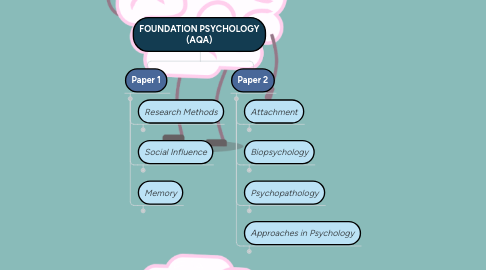
1. Paper 1
1.1. Research Methods
1.1.1. The experimental method
1.1.2. Control of variables
1.1.3. Return to hypotheses and other things
1.1.4. Experimental design
1.1.5. Laboratory and field experiments
1.1.6. Natural and quasi-experiments
1.1.7. More problems with experiments
1.1.8. Sampling
1.1.9. Ethical issues
1.1.10. Dealing with ethical issues
1.1.11. Observational techniques
1.1.12. Observational design
1.1.13. Self-report techniques
1.1.14. Self-report design
1.1.15. Correlations
1.1.16. Other research methods
1.1.17. Mathematical skills
1.1.18. Measures of central tendency and dispersion
1.1.19. Display of quantitive data and data distributions
1.1.20. Types of data
1.1.21. Introduction to statistical testing
1.1.22. The scientific process and peer review
1.1.23. Psychology and the economy
1.1.24. Content analysis
1.1.25. Case studies
1.1.26. Reliability
1.1.27. Validity
1.1.28. Features of science
1.1.29. Probability
1.1.30. Statistical tests
1.1.31. Non-parametric tests of difference
1.1.32. Tests of correlation
1.1.33. Chi-Squared test
1.1.34. Reporting investigations
1.2. Social Influence
1.2.1. Types of conformity
1.2.2. Explanations of conformity
1.2.3. Variables affecting conformity
1.2.4. Conformity to social roles
1.2.5. Situational variables affecting obedience
1.2.6. Agentic state and legitimacy of authority
1.2.7. The Authoritarian Personality
1.2.8. Resistance to social influence
1.2.9. Minority Influence
1.2.10. Social influence processes in social change
1.3. Memory
1.3.1. The multi-store model of memory (Atkinson and Shiffrin 1968)
1.3.2. The working memory model (Baddeley and Hitch 1974)
1.3.3. Types of long-term memory
1.3.4. Explanations for forgetting: Interference
1.3.5. Explanations for forgetting: Retrieval failure
1.3.6. Accuracy of eyewitness testimony: Misleading information
1.3.7. Accuracy of eyewitness testimony: Anxiety
1.3.8. Improving the accuracy of eyewitness testimony: The cognitive interview
2. Paper 2
2.1. Attachment
2.1.1. Caregiver-infant interactions
2.1.2. The development of attachment
2.1.3. Animal studies of attachment
2.1.4. Explanations of attachment: Learning Theory
2.1.5. Explanations of attachment: Bowlby’s theory
2.1.6. Ainsworth’s Strange Situation: Types of attachment
2.1.7. Cultural variations in attachment
2.1.8. Bowlby’s theory of maternal deprivation
2.1.9. Romanian orphan studies: Effects of institutionalisation
2.1.10. The influence of early attachment
2.2. Biopsychology
2.2.1. The nervous system
2.2.2. Neurons and synaptic transmission
2.2.3. The endocrine system
2.2.4. The fight-or-flight response
2.2.5. Localisation of function
2.2.6. Lateralisation of split-brain research
2.2.7. Plasticity and functional recovery of the brain
2.2.8. Ways of studying the brain
2.2.9. Circadian rhythms
2.2.10. Ultradian and infradian rhythms
2.2.11. Endogenous pacemakers and exogenous zeitgebers
2.2.12. Psychopathology
2.2.12.1. Definitions of abnormality
2.2.12.2. Mental disorders
2.2.12.3. The behavioural approach to explaining phobias
2.2.12.4. The behavioural approach to treating phobias
2.2.12.5. The cognitive approach to explaining depression
2.2.12.6. The cognitive approach to treating depression
2.2.12.7. The biological approach to explaining obsessive-compulsive disorder (OCD)
2.2.12.8. The biological approach to treating obsessive-compulsive disorder (OCD)
2.3. Psychopathology
2.3.1. Definitions of abnormality
2.3.2. Mental disorders
2.3.3. The behavioural approach to explaining phobias
2.3.4. The behavioural approach to treating phobias
2.3.5. The cognitive approach to explaining depression
2.3.6. The cognitive approach to treating depression
2.3.7. The biological approach to explaining obsessive-compulsive disorder (OCD)
2.3.8. The biological approach to treating obsessive-compulsive disorder (OCD)
2.4. Approaches in Psychology
2.4.1. The origins of psychology
2.4.2. The behaviourist approach
2.4.3. Social learning theory
2.4.4. The cognitive approach
2.4.5. The biological approach
2.4.6. The psychodynamic approach
2.4.7. Humanistic psychology
2.4.8. Comparison of approaches
